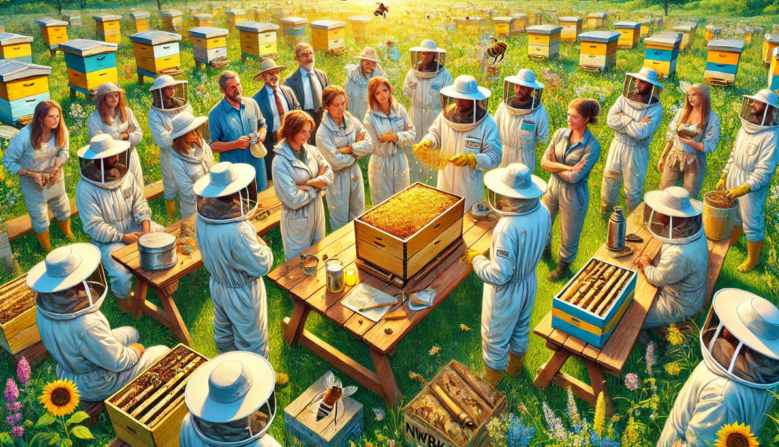Introduction to the Round Table NWBKA Initiative
Beekeeping is more than just a hobby; it’s an essential part of our ecosystem. As the world faces increasing environmental challenges, the role of beekeepers has never been more crucial. Enter the Round Table NWBKA Initiative—a groundbreaking effort designed to unite and empower beekeepers across regions. This initiative aims not only to address pressing issues but also to foster a community that thrives on shared knowledge and collaboration. If you’re passionate about bees or curious about how they impact our world, keep reading! The future of beekeeping is bright, and with initiatives like this one, we can all play a part in ensuring its success.
The Importance of Beekeeping in Today’s Society
Beekeeping plays a vital role in our ecosystem. Bees are essential pollinators, helping to fertilize plants and increase crop yields. This process is crucial for food production, influencing both the economy and our diets.
Without bees, many fruits, vegetables, and nuts would struggle to thrive. Their decline could lead to reduced biodiversity and increased food scarcity.
Beyond agriculture, beekeeping fosters environmental awareness. It connects people with nature, inspiring conservation efforts that benefit various species.
Moreover, honeybees produce honey and beeswax—natural products valued for their health benefits and uses in industries from cosmetics to medicine.
As beekeepers cultivate hives and promote bee health, they contribute significantly to sustainability efforts worldwide. Their dedication creates a ripple effect that supports local ecosystems while enriching communities through education about these remarkable insects.
Challenges Faced by Beekeepers
Beekeeping is a rewarding yet challenging endeavor. One major issue beekeepers face is colony collapse disorder. This phenomenon leads to the sudden disappearance of worker bees, leaving behind a queen and young bees.
Pesticides also pose a significant threat. Chemicals used in agriculture can harm bee populations directly or disrupt their foraging patterns. The impact on hives can be devastating.
Climate change further complicates matters. Shifts in weather patterns affect flowering plants and availability of food sources. Bees rely heavily on environmental cues for their survival.
Additionally, diseases and parasites like Varroa mites are constant threats that weaken colonies over time. Beekeepers must remain vigilant to manage these health issues effectively.
Urbanization shrinks natural habitats, making it harder for bees to thrive in many areas. Balancing modern development with ecological needs presents an ongoing challenge for those passionate about apiculture.
The Goals and Objectives of the Round Table NWBKA Initiative
The Round Table NWBKA Initiative aims to create a collaborative environment for beekeepers. By fostering communication, members can share knowledge and resources effectively.
One primary goal is to enhance sustainable practices in beekeeping. The initiative emphasizes eco-friendly methods that protect bee populations while improving honey production.
Additionally, education plays a crucial role. Workshops and seminars are organized regularly, covering everything from hive management to disease control. This empowers beekeepers with the latest techniques and trends.
Advocacy is another key objective. The initiative seeks to influence policies that affect local ecosystems and promote bee health on broader platforms.
Creating a supportive community where both novice and experienced beekeepers can thrive remains at the forefront of its mission. Engaging events foster camaraderie among participants while reinforcing their commitment to keeping bees healthy and productive.
How the Initiative is Making a Positive Impact on Beekeeping
The Round Table NWBKA Initiative is reshaping the landscape of beekeeping. By fostering collaboration among local beekeepers, it encourages knowledge sharing and innovation.
New techniques and sustainable practices are being adopted widely. This shift not only benefits individual hives but also strengthens entire ecosystems.
Workshops and seminars hosted by the initiative provide invaluable resources. Beekeepers gain insights into pest management, environmental sustainability, and hive health.
Moreover, community outreach programs raise awareness about the critical role bees play in food production. This creates a stronger support network for both amateur and professional apiarists.
The positive ripple effect extends beyond just beekeepers to local farmers as well. Strengthened bee populations lead to improved pollination services that enhance crop yields across various agricultural sectors.
Such collective efforts illuminate a brighter future for all involved in this vital industry.
Success Stories from Participating Beekeepers
Sarah, a participant in the Round Table NWBKA initiative, transformed her small backyard hive into a thriving business. With guidance from experienced mentors, she learned sustainable practices that boosted honey production and improved bee health.
Then there’s Tom, who struggled with colony collapse for years. Through workshops offered by the initiative, he discovered effective management techniques. Now his hives are flourishing once more.
Another inspiring story comes from Emily and Mike. They started beekeeping as a hobby but quickly recognized its potential. The resources provided by Round Table NWBKA helped them transition to commercial beekeeping while maintaining eco-friendly practices.
These stories highlight how community support can lead to remarkable transformations in beekeeping journeys. Each beekeeper is not just surviving; they are thriving thanks to shared knowledge and collaboration within this innovative network.
How to Get Involved with the Round Table NWBKA Initiative
Getting involved with the Round Table NWBKA initiative is simple and rewarding. First, be sure to visit their official website for updates on workshops and events tailored for all skill levels.
Joining local meetings can help you connect with fellow beekeepers who share your passion. This is a great opportunity to learn about best practices and innovative techniques in beekeeping.
Volunteering at community outreach programs can also make a difference. These initiatives aim to educate others about the importance of bees while fostering a supportive network of enthusiasts.
If you have expertise or resources, consider contributing by sharing your knowledge through talks or written materials. Every little effort counts toward elevating the art of beekeeping.
Social media platforms are another way to stay engaged. Participate in discussions, share experiences, and keep up with industry trends that affect our buzzing friends.
Conclusion: Embracing a Bright Future for Beekeeping
As we look to the future, the Round Table NWBKA Initiative stands as a beacon of hope for beekeepers and advocates alike. It embodies collaboration, innovation, and commitment—key elements that can help revitalize our relationship with these essential pollinators.
With its focus on education and support, this initiative fosters a community where knowledge is shared freely. Beekeepers are no longer navigating challenges alone; they have access to resources that empower them to adapt in an ever-changing environment.
By addressing critical issues like declining bee populations and climate change impacts, the Round Table NWBKA is paving the way for sustainable practices in beekeeping. The stories of those who have thrived under its guidance serve as inspiration for both seasoned apiarists and newcomers eager to learn.
Participation in this movement means joining hands with others who share a passion for bees and their vital role in our ecosystem. Whether through workshops or local events, there’s room for everyone interested in making a difference.
The journey ahead may not always be straightforward, but with initiatives like the Round Table NWBKA leading the charge, there’s every reason to remain optimistic about what lies ahead for beekeeping—and by extension—the world at large. Embracing such opportunities ensures that we safeguard not just our honeybees but also secure healthier environments for generations to come.








